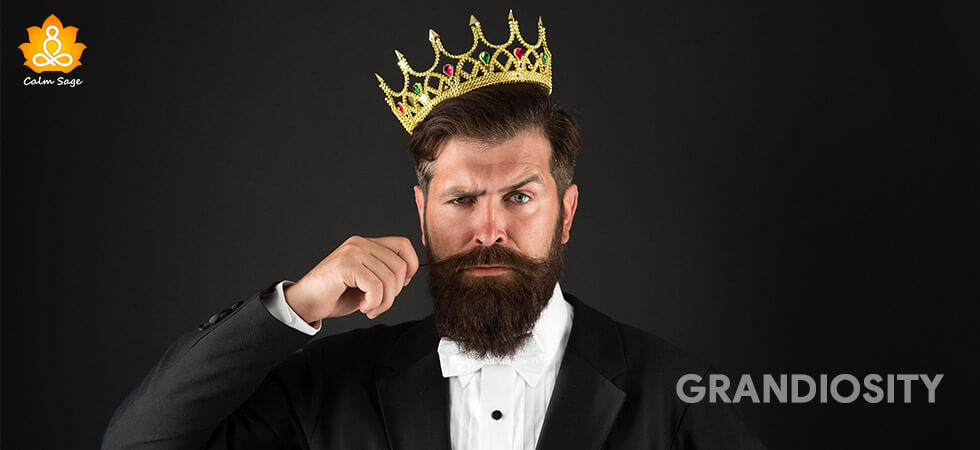Exploring Grandiosity And Its Association With Mental Health Disorders

Excessiveness of anything whether it’s ego, pride, or even love can be harmful. I, from time to time, find myself feeling proud about my talents and abilities, but this kind of self-confidence is one thing, and indulging in excessive pride – so much that confidence turns into cockiness – is another. Between this fine line, comes grandiosity or delusion of grandeur.
Grandiosity is an exaggerated sense of self-importance and superiority where you have an inflated sense of self when it comes to your abilities, talents, and achievements. It’s a complex condition that can manifest itself in different ways in different disorders.
When you have a sense of grandiosity, you believe that you only have unique traits that others don’t seem to possess, you consider yourself untouchable and peerless, and you have constant feelings of superiority. If left unchecked, grandiosity can bleed into the other aspects of your life such as social life, relationships, and work life.
Like any other personality trait, grandiosity can be mapped on a spectrum of thoughts and actions. In this article, we’re exploring grandiosity and how it connects with various mental health disorders.
What is Grandiosity?
Grandiosity is a mental construct that involves a set of unrealistic beliefs in your superiority and uniqueness. Grandiose delusions can manifest as an exaggerated sense of self-image, a need for excessive praise, and a sense of entitlement.
While I can agree that self-confidence is important and so is building healthy self-esteem, having grandiosity can blur the lines between cockiness and arrogance, giving you a distorted sense of self-perception.
If you have a sense of grandiose, then you may;
- Dismiss others’ achievements or one-up yours
- Believe that you need no one’s help
- Believe that you are superior
- Fail to identify how your actions are hurting others
- Lash out or snap in anger when you are faced with criticism
Disorders Associated with Grandiosity
1. In Bipolar Disorder
During the manic episodes of bipolar disorder, you may experience grandiose delusions when you believe that you have extraordinary skills, abilities, and talents. These grandiose delusions may cause you to be impulsive, have poor judgment, and increase your risk-taking behaviors.
Grandiosity may occur alongside symptoms such as euphoric mood, racing thoughts, increased activities, and excessive talking. During the phase of grandiosity, your superior thinking may also not match your behavior.
2. In Narcissistic Personality Disorder (NPD)
Grandiosity is a key symptom or feature of NPD. In narcissistic personality disorder or NPD, there’s an inflated sense of self-worth, a constant need for praise, and a surprising lack of empathy. If you have NPD, then you may believe that you are superior to others and can even dabble in subtle manipulation for personal gain.
Unlike in BPD, where delusions of grandeur are present during manic episodes, in NPD, grandeur is persistent. They may also be tied with other signs and symptoms of the personality disorder such as lack of empathy and the need for admiration.
Delusions of grandeur in narcissism may manifest as;
- Feeling entitled to special treatment
- Exaggerating achievements to receive praise and admiration
- Looking down on others because of your sense of superiority
3. In Borderline Personality Disorder (BPD)
In borderline personality disorder, grandiosity may act as a defense mechanism to protect yourself from feelings of emptiness and low self-esteem. Delusions of grandeur in BPD may manifest as having an unstable self-image, impulsivity, and intense fear of abandonment. Grandiose is not a particularly common symptom of BPD, yet there is a sense of idealization present that may resemble grandiose behaviors.
If someone tries to devalue you, you may begin to think of idealized thinking in detail to prove the person wrong. These thoughts are often unrealized.
4. In Antisocial Personality Disorder (ASPD)
If you have antisocial personality disorder, then you may also present grandiosity in your disregard for social norms. You may view yourself above the social laws and rules and even manipulate others without feeling regret.
While grandiosity is not a key feature of ASPD, it can be present in some people with the disorder. More often than not, grandiose behaviors manifest in ASPD as a sense of superiority and entitlements, where you consider yourself above the law. Your inflated sense of self-image may only fuel your disregard toward others.
This sense of delusion can also lead to issues such as engaging in manipulative behavior, exploiting others without regrets, using charm to manipulate situations, and more.
5. In Attachment Disorders
More commonly, in reactive attachment disorder, where there is emotional withdrawal and an inability to connect with the caregivers, grandiosity may be present. In such disorders, abuse, childhood neglect, and lack of affection from caregivers are the cause of the symptoms.
If you have attachment disorder, then you may avoid seeking comfort and emotional intimacy with others. In various studies, it has been found that people with reactive attachment disorder may show grandiose behaviors through;
- Showing little to no concern for their actions
- Having a lack of regret or guilt when their actions hurt others
- Using manipulative behaviors for their advantage
- Believing that their actions are more positive than harmful
- Not caring about others’ needs and only theirs
When to Seek Help?
Dreaming big and wanting to reach new heights is not uncommon, it’s even commendable, but when self-confidence can turn into a sense of superiority, it can become harmful not only to you but to others around you as well. Grandiose behaviors can become harmful when it prevents you from being realistic, negatively affects your relationships, and makes you engage in downright manipulative actions.
Seeking help from a professional can help you change your grandiose thinking. Treatment for grandiosity can include;
1. Psychotherapy: Approaches such as cognitive-behavioral therapy (CBT) and psychodynamic therapy can help you address your grandiose thinking. You can also find a safe space in therapy to work on improving your self-confidence and self-awareness.
2. Medications: In severe cases where psychotic symptoms are present with grandiose delusions such as in bipolar disorder or schizophrenia, then medications can be prescribed as a treatment option by a psychiatrist.
3. Building Support Networks: It is also recommended to create a support network. Having a strong support network can help you get validation, increase empathy, and even nurture your sense of self. With others’ help, you can find a balanced self-perspective.
4. Engaging in Self-Reflection: If you’re struggling with grandiose delusions or a sense of grandiosity, then you can try engaging in self-reflection techniques such as journaling and mindfulness to banish idealized thoughts and feel more present in the moment.
Wrap-Up
Grandiosity is a complex condition where you constantly struggle with an exaggerated sense of self-importance and superiority. This condition or symptom in some cases can span across various mental health disorders and personality disorders such as bipolar disorder, narcissistic personality disorder, borderline personality disorder, schizophrenia, delusional disorder, and more.
Understanding how grandiosity manifests in different disorders can help you find the best treatment approach. With the right therapy, medication, and self-help strategies, you can work through your grandiose behaviors and figure out how to balance your self-perception and sense of self-importance, healthily.
Grandiosity might be a personality trait in some disorders and a symptom in others, but regardless of its presence, you can learn to overcome the delusions of grandeur and live a fulfilling life.
I hope this blog helped you understand how grandiosity is associated with different mental health disorders and how it can be treated. You can share your thoughts and views on delusions of grandeur and their effects on mental well-being in the comments below.
Take care!




















